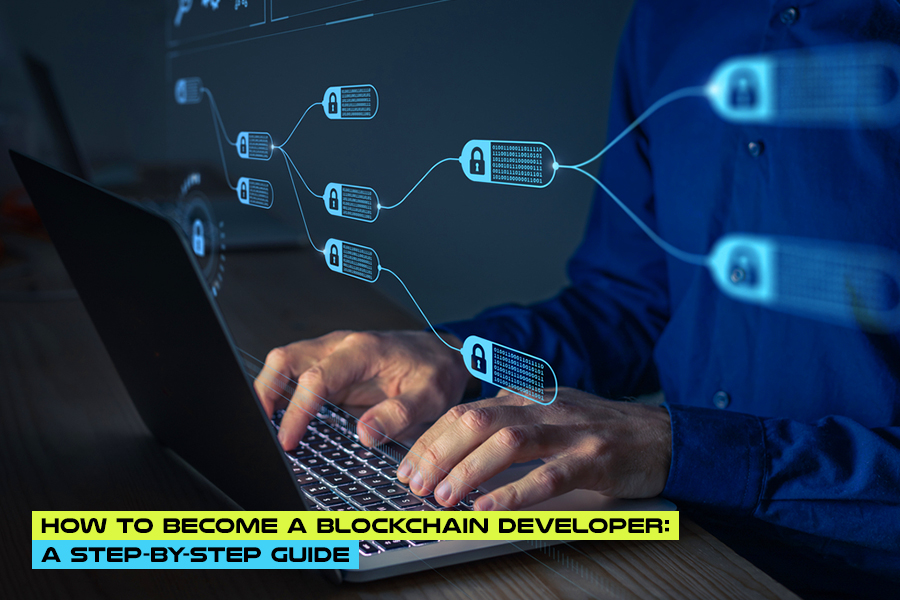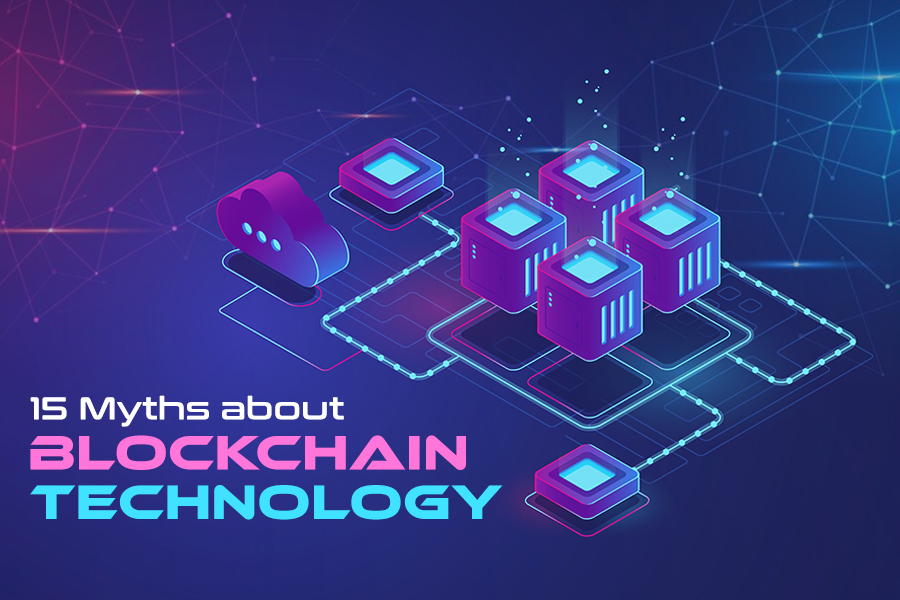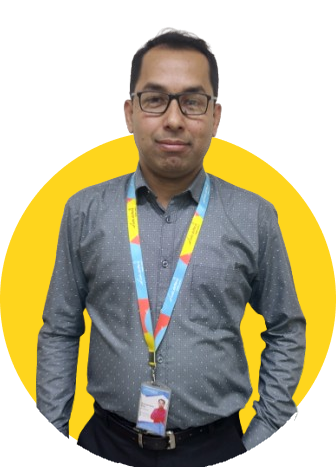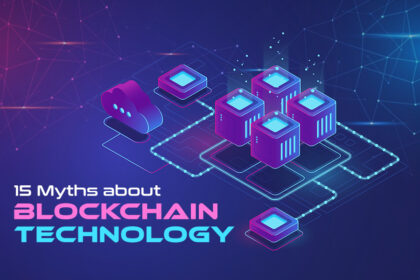
Do you hold a passion for coding? Are you curious about how cryptography and blockchain technology work? Then, you might consider combining your interests and becoming a professional blockchain developer!
Blockchain development refers to crafting and maintaining blockchain platforms and related tools. It involves creating infrastructures that allow blockchain-based services and applications to operate seamlessly, like smart contracts and digital currencies.
As more industries integrate blockchain technologies into their processes, the demand for blockchain developers is soaring. In fact, according to Glassdoor, the demand for blockchain-related jobs has increased by 300% compared to the previous year. Considering the pivotal role blockchain developers play in shaping the future of data security and digital transactions, experts are only expecting the demand to rise.
With that in mind, it makes sense that you want to be a part of the revolutionising industry and benefit from its growth potential and dynamic new technology.
However, do you know where to get started? What skills do you need to become a successful blockchain developer?
Don’t fret; we have got your back!
Jump into the below section for a comprehensive, step-by-step guide to becoming a professional blockchain developer! From the basic blockchain-related jargon to career paths, we cover all the necessary information you need to give your career a head start!
Understanding The Basics
Blockchain has immense potential to transform a wide range of industries, including real estate, healthcare, supply chain management and finance. As a blockchain engineer, you could play a leading role in this drastic modification.
However, before entering the exciting blockchain world, you must understand the basic jargon and technologies related to blockchain.
So, read on!
What is blockchain?
There are lots of myths regarding blockchain, making the technology sound pretty complex. However, blockchain, at its core, is a digital ledger. It records digital or cryptocurrency transactions between parties in an immutable, secure and transparent manner. Unlike traditional ledgers, blockchain is decentralised. It means no single entity owns or controls it.
Instead, it uses a network of computers or nodes to store data in blocks. Furthermore, these blocks are chronologically linked, which forms a chain.
Each block contains a hash, a unique code generated by a complex mathematical algorithm. The hash is critical in ensuring the block’s data is tamper-proof. Once you add a block of information to the chain, it forms a permanent part of the ledger that you cannot delete or modify without the network’s consensus.
The mechanisms of blockchain technology allow users to create unalterable ledgers for tracking payments, orders, and other transactions.
The key terms and components of blockchain technology
Whether you wish to become a core blockchain developer or a blockchain software developer, you will need an in-depth understanding of blockchain’s essential terms and technologies.
- A distributed ledger: A distributed ledger technology is a shared database that stores the transactions in the blockchain network, like a shared file that every team member can edit. The technology poses strict rules on who can edit the files and how they can do it. Once you have recorded an entry, deleting it can be nearly impossible.
- Smart contracts: Smart contracts are a feature of blockchain systems that define the conditions for corporate bond transfer. They allow organisations to self-manage and automate their business contracts to check the if-then before making a transaction.
- Public key cryptography: Public key cryptography is another unique feature that uniquely identifies participants in the network to generate two sets of keys. One is a public key, which is familiar to everyone. The other one is a private key unique to each member. Both keys work together to uncover the data.
- Cryptocurrency: If you have ever researched becoming a cryptocurrency developer, you would know that cryptocurrency is a digital medium of exchange. It uses blockchain technology and cryptographic techniques to control the creation of monetary units and verify the transfer of funds.
- Consensus algorithms: It ensures all the nodes in the network agree on the recorded validity of the transactions. Most modern blockchains use a proof-of-stake mechanism to check the authenticity of information added to the chain.
Popular blockchain platforms
Blockchain platforms are software frameworks that enable developers to create and deploy dApps or decentralised applications on a blockchain network. A smart contract developercan use these platforms for tokenisation, writing smart contracts, and interacting with the blockchain.
Look at the most popular blockchain platforms you should know as a developer.
- Ethereum: A decentralised blockchain platform, Ethereum allows developers to build smart contracts and dApps. The platform uses a native cryptocurrency, Ether, to power its transactions.
- Bitcoin: One of the most well-known blockchain platforms, Bitcoin uses a peer-to-peer network to complete transactions. Despite its lack of flexibility, the platform is ideal for digital transactions and storage.
- Binance Smart Chain: Developed by the cryptocurrency exchange Binance, the Binance Smart Chain uses Ethereum and is known for its fast, cost-effective transactions.
- Solana: Designed to be scalable and secure, Solana uses the unique consensus algorithm Proof of History to facilitate quick transactions. Blockchain technology specialists prefer Solana for DeFi applications and NFT marketplaces.
- Hyperledger Fabric: Hyperledger Fabric is another open-source platform for blockchain technologies. Due to its modular architecture and various consensus algorithms, most developers use it to build enterprise-grade solutions.
Prerequisites For Blockchain Development
To become a successful blockchain solution architect, you must have a solid understanding of programming foundation, mathematics and computer science. Also, you should comprehend blockchain technology’s technical concepts and details, including databases, distributed systems and cryptography. Strong problem-solving and attention to detail are also crucial to navigating the complex world of blockchain.
Here, take a close look at the educational background and skills you will need to become a blockchain developer:
1. Degree courses
There are multiple degree courses to prepare you to face the complexities of blockchain and become a successful blockchain developer. Although the courses vary in focus, duration, and levels, they all aim to equip you with the skills required to understand blockchain architecture. Some of the degree courses preferred for the role of blockchain developer include:
- Computer science
- Information technology
- Mathematics
- Blockchain and cryptocurrency
- Business and Finance
While having a degree in these subjects is unnecessary, acquiring one will certainly put you ahead of others.
2. Blockchain developer certifications
Besides traditional degrees, you can consider enrolling in online or offline courses specifically focused on blockchain development to take your skills to the next level. These courses will help you enhance your expertise, gain competitive advantage and add credibility to your skills. Popular certifications in blockchain development include
- Certified Blockchain Developer
- Certified Ethereum Developer
- Certified Smart Contract Auditor
3. Proficiency in programming languages
A blockchain developer needs to be proficient in several blockchain programming languages, including:
- Solidity
- Java
- Python
- Go
- C++
Since Solidity is among the most popular programming languages, particularly on the Ethereum Blockchain, for developing smart contracts, becoming a Solidity developer can be a rewarding career for you.
4. In-depth understanding of blockchain fundamentals
From understanding consensus algorithms to being well-versed in block creation and validation, you will need in-depth comprehension of blockchain fundamentals to become a developer. In particular, you must possess mastery of:
- Smart contract development, which uses programming languages like Solidity to write the terms and conditions of an agreement into lines of code
- Decentralised application or DApp development, which are applications running on a peer-to-peer blockchain network rather than a centralised server
- Cryptography, including private and public key encryption, hash functions and digital signatures
- Distributed systems, including skilled at designing and executing distributed systems with blockchain technology
- Knowledge of blockchain frameworks, such as Corda, Hyperledger and Ethereum
5. Web development, testing and debugging
Whether you wish to become a distributed ledger developer or a blockchain coding expert, you should have hands-on experience with fundamental web development technologies, such as JavaScript, CSS and HTML.
Additionally, mastery in testing and debugging blockchain-based solutions and resolving issues related to DApps and smart contracts will help you become more appealing to employers.
6. Understanding of data structure, networking and consensus algorithm
Blockchain technology relies heavily on algorithms and data structure to ensure the security and integrity of the decentralised systems.
Hence, as a blockchain programmer, you must gain a solid understanding of these two fundamental concepts.
- You shall learn about the different data structures, like hash tables, linked lists and Merkle trees, to understand how blockchain stores and manages data and how data retrieval, verification and authentication work in a decentralised network.
- Knowledge of consensus algorithms (such as Proof of Stake and Proof of Work), encryption algorithms (like AES) and cryptographic algorithms (such as RSA and SHA-256) is essential for developing efficient blockchain solutions.
7. Experience with version control systems
Version control systems (e.g. Git) enable developers to manage code repositories, track changes and collaborate with other team members. Mastering these systems will give blockchain developers the upper hand and allow them to contribute to open-source projects, resolve conflicts, and manage codebase versions.
8. Knowledge of encryption techniques
Encryption techniques are an essential part of blockchain security practices. They help safeguard data integrity, uphold security measures, and protect platform user privacy. Hence, learning about symmetric and asymmetric encryption techniques is critical to becoming a successful blockchain developer.
Getting Started as a Blockchain Developer
Now that you know the skills and ideas you need to become a blockchain developer, you would want to know where to start.
Luckily, resources are abundant for learning blockchain development, from offline courses that provide face-to-face guidance to online classes that allow you to learn from home.
However, if you are a beginner, it’s best to start your learning process with the following resources:
- University programs and certifications
Several renowned universities in India and abroad offer blockchain-related programs. These programs range from undergraduate and graduate degrees in engineering and computer science to postgraduate programs suitable for professionals. IIT Kharagpur, IIT Madras, and the Indian Institute of Science offer excellent programs for students looking to build a career in blockchain.
- Online and offline courses and tutorials
Suppose you wish to become a blockchain or decentralised application developer. In that case, numerous online and offline courses and tutorials help you get started, ranging from free introductory classes to advanced paid courses. For online courses, we recommend visiting Udemy, Codecademy and Coursera.
For offline courses, you can refer to any credible institution providing comprehensive blockchain development courses for professionals. Webskitters Academy in Kolkata offers online and offline courses to help students thrive in Distributed Ledger Technology. Their professional guidance enables students to take free demo classes and work on live projects.
- Blockchain developer boot camps
If you want a more immersive learning experience, consider joining blockchain developer workshops or boot camps. Participating in a virtual boot camp will provide you with the perfect opportunity to get hands-on experience in Solidity programming and learn from professional engineers. Also, you may gain expertise in the basics of blockchain, creating full-stack DApps, developing and deploying smart contracts and more.
Learning Blockchain Development Step-by-Step
The requirement to do monetary transactions without involving financial institutions and central authorities 24*7 led to the development of several blockchain programming languages and tools. Familiarising yourself with these languages should be the first step in your journey to becoming a blockchain application developer.
What are the most used programming languages in blockchain technology development? What else should you learn to enhance your awareness of blockchain development? Find out below!
1. Get well-versed in blockchain programming languages
From well-known programming languages, like Java and Python, to languages specifically ideal for blockchain programming, such as Solidity, you shall know several programming languages to sharpen your skills in blockchain development.
- Solidity: Well-known for being the most stable blockchain programming language, Solidity is perfect for developing smart contracts for Ethereum Virtual Machine. Solidity is user-friendly, provides a high accuracy rate and features multiple type-safe functions.
- Java: Developer-friendly, multithreaded, independent and secure- Java is one of the most common programming languages to develop Ethereum, NEO, Hyperledger Fabric, IOTA, etc.
- Python: With comparatively shortcodes and an extensive library, Python is one of the best coding languages for beginner blockchain platform developers.
- C++: The data-hiding and comparatively robust and rapid functionalities of C++ make it a popular programming language, particularly for Stellar, Ripple, and Bitcoin.
- Ruby: Greatly loved in the developer community, Ruby is a multi-paradigm language that allows developers to use cross-platforms for blockchain programming.
In addition to these blockchain programming languages, we recommend getting hands-on experience using PHP, Go, Simplicity, C#, and Rholang to keep your skills up to date with the market’s demand.
2. Explore the different tools used in blockchain development
In addition to the general programming languages, a professional blockchain platform developer uses multiple tools to enhance the security and efficiency of their creation.
Some of these tools include:
- Solc: Solc or Solidity Compiler, as the name sounds, is a command-line compiler for solidity programs. It converts the solidity code to bytecode to interpret it for the Ethereum Virtual Machine. Solc has two variations for you, Solcjs and Solc, written in C++.
- Truffle: Developers use Truffle for compiling, deploying and testing smart contracts and building decentralised applications or DApps. You can also use the complete blockchain environment to automate Mocha and Chai contract testing.
- Ganache: This blockchain simulator enables GUI to stimulate blockchain networks without an actual remote network or test networks. You can use it to receive vacant Ethereum addresses with fake 100 ETH.
- Web3.js: It’s a collection of libraries used to interact with Ethereum nodes locally or remotely. It provides developers with an API to interact with blockchain easily.
- Metamask: Metamask is a digital wallet that allows users to send, receive and store ETH cryptocurrency and tokens. You can add it as a web browser extension and use it as an intermediate between the decentralised applications and blockchain.
You can also explore Remix, Geth, and Embark in addition to the above tools to make your blockchain application development process more straightforward and less time-consuming.
3. Gain hands-on experience
In addition to understanding the theoretical information, try your best to gain hands-on experience by building various blockchain applications. Learn about the mentioned programming languages and experience with the tools, and test your skills by crafting smart contracts and DApps. Furthermore, you can try internships at enterprises looking to expand in the blockchain domain to gain real-world experience.
Exploring Advanced Topics
Once you nail the basics of blockchain and cryptocurrency development, take your learning sessions to the next level by exploring the advanced topics in the domain. Start by testing your ideas about consensus algorithms and cryptography fundamentals. Then, get an in-depth Knowledge of blockchain architecture and networks.
Blockchain has several different networks, including
- Public blockchain
- Private blockchain
- Hybrid blockchain
- Consortium blockchain
- Permissionless blockchain
- Permissioned blockchain
Furthermore, blockchain has multiple protocols developers need to know about.
These protocols are a set of rules and guidelines that control how blockchain operates. They dictate how the platform validates transactions, adds new blocks to the chain and achieves consensus.
You will need education on the following protocols on your path to becoming a professional blockchain to consensus algorithm developer.
- Proof of Work, which uses computational puzzles to add new blocks and validate transactions
- Proof of Stake that chooses validators based on their holdings of cryptocurrency
- Delegated Proof of Stake, which gives the responsibility to choose validators to other stakeholders
- Byzantine Fault Tolerance that uses a consensus algorithm to ensure all nodes in the algorithm are in agreement
Building Practical Experience
The best way to gain practical experience in blockchain development is by engaging in open-source projects and connecting with the correct community.
Here’s how to dive into the domain and enrich your skills and experience.
- Contribute to existing projects: Browse through open-source blockchain projects on accessible platforms like GitHub to understand project purpose, development guidelines and codebase. Actively participate in the projects to enhance your skills.
- Join blockchain developer forums and communities: Connect with like-minded individuals, stay updated with industry news and share your learnings by identifying relevant communities on platforms like Telegram and Reddit. Furthermore, attend blockchain meetups, events and conferences, participate in hackathons, and collaborate on side projects to gain valuable insights.
- Leverage collaborative tools: Teamwork is critical in blockchain development. If you want tools to streamline your collaborative efforts, consider using version control systems like GitHub and GitLab, communication and project management tools (e.g. Asana, Trello, and Slack), and documentation platforms (e.g. Notion and Confluence).
- Follow thought leaders and influencers: Identify influential figures in the domain that provide crucial insights. Follow their podcasts, blogs, and social media accounts to stay up-to-date with emerging trends, cutting-edge research, and provoking analyses.
- Build a portfolio: Once you gain considerable experience as a blockchain or consensus algorithm developer, create and constantly update a thorough, cohesive, sleek portfolio. It will help you stand out in the job market and improve your placement chances.
Career Paths And Opportunities
The landscape of blockchain technology offers a plethora of career opportunities in various industries. Thus, before you dive into the learning material, it’s essential to determine which role best suits your skills and desires.
Here is a closer look at the most popular role in blockchain technology and the industries offering the most lucrative opportunities.
Diverse roles in blockchain development
Each role in the blockchain domain comes with its unique set of responsibilities, requirements and challenges.
- Blockchain developer: As a blockchain developer, you will be responsible for designing, executing, and maintaining blockchain networks and holding professional expertise in programming languages.
- Blockchain architect: Architects usually design the typical structure and framework of blockchain systems with a deep understanding of security protocols, scalability solutions and distributed ledger technology.
- Cryptography expert: These professionals ensure the security and integrity of blockchain networks, develop cryptographic algorithms, protect sensitive data, and implement encryption.
- Smart contract developer: You will need impressive skills in creating self-executing contracts and an understanding of translating business terms into codes and programming languages like Solidity to be a smart contract developer.
- Blockchain consultant: As a blockchain consultant, you will offer your expertise to companies seeking to adopt blockchain technology. You will guide them on regulatory compliance, business process optimisation and integration strategies.
Employment Prospects In Various Industries
Sectors across different industries are executing blockchain technology in their processes to simplify transactions of data and currency.
Here are the industries providing top-notch opportunities for blockchain developers.
- Financial services: Financial institutions have been at the forefront of the blockchain revolution. Unsurprisingly, they offer lucrative opportunities in areas such as identity verification, decentralised finance, and digital payments.
- Supply chain and logistics: Supply chain and logistics companies worldwide are looking for blockchain developers to enhance traceability, streamline operations, and reduce fraud.
- Healthcare: As a blockchain developer, you can help the healthcare industry leverage blockchain for interoperability, combat counterfeit drugs, and exchange health data.
- Energy and sustainability: Blockchain experts are contributing to facilitating efficient energy trading, carbon credit tracking and grid management.
- Government and public sector: The public sector also offers opportunities for blockchain developers in areas such as digital identities, land registration, and voting systems.
Build A Professional Profile In the Blockchain Industry
Building a robust professional profile and network in a rapidly evolving industry like blockchain can be as rewarding as challenging. Below are some expert-approved tips to help you flourish in the field.
- Attend industry events: Meet potential business partners, attend blockchain hackathons and get practical exposure to the technology.
- Define your niche: Build a solid personal brand by defining your niche. Specify your interests and expertise in the blockchain space.
- Leverage social media: Use platforms like LinkedIn to connect with industry leaders, showcase your projects and highlight your profile.
- Keep learning and sharing: Educational platforms, like Coursera, are constantly releasing new courses and updating their old modules to help professional’s upskill. Take advantage of these courses, and share your accomplishments to attract visitors.
- Professional associations: Besides participating in collaborative projects and in-person networking, consider joining well-established blockchain communities, such as the Global Blockchain Business Council and Chamber of Digital Commerce, to build your professional profile.
- Cold outreach: Don’t hesitate to send a well-crafted email to the industry leaders you admire or employers looking for blockchain experts.
Challenges And Best Practices
Over the years, the adoption of blockchain technology has faced numerous challenges. Consequently, the difficulties in executing the technology have created different obstacles for blockchain developers.
Some of the most common challenges developers face these days include scalability issues limiting the adaption of blockchain, vagueness about the technology’s security, lack of interoperability and awareness, complex user experience, the high cost of learning blockchain technology, and constantly changing regulations.
Fortunately, overcoming these challenges is possible. You can start by finding cost-effective blockchain development courses in your area. Find your niche and determine what area matches your educational background and skills the most. Earn your certification from a credible institution that offers placement guidance and follow best practices for writing secure and efficient blockchain code, including
- Solidity and smart contract auditing
- Security concepts like principles of least privilege
- Input validation and data sanitisation
- Secure external contract interactions
- Secure Ether and asset handling
- Code reviews and testing
- Security monitoring and incident response
- Secure randomness generation
- Contract upgradeability and governance
Conclusion
Undoubtedly, there’s the demand for blockchain developers is skyrocketing right now. Companies in various industries seek developers to build and maintain blockchain-based applications. While the future looks bright, becoming a blockchain developer still has some challenges. You will face several hurdles, from navigating complex programming languages to networking in the industry.
Thankfully, you have Webskitters Academy to guide you. With our online and offline courses, you can become an expert in this high-paying field and get fast placement in leading organisations. We have a team of industry-leading guides to give you the hands-on experience you need to excel in the various roles in the blockchain domain.
So, try out our free demo class today. Contact us now!
Search
I Want to Learn...
Category
Explore OurAll CoursesTransform Your Dreams
into Reality
Subscribe to Our Newsletter
"*" indicates required fields
Similar Reads

15 Myths about Blockchain Technology You Must Know




